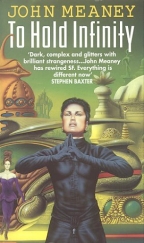To Hold Infinity
John Meaney
Bantam / Transworld
UK Mass Market Paperback
ISBN 0-553-50588-2
Publication Date: 05-02-1998
556 Pages; £5.99
Date Reviewed: 01-30-03
Reviewed by Rick Kleffel © 2003

REFERENCES
COLUMNS
|
|
|
To Hold InfinityJohn MeaneyBantam / TransworldUK Mass Market PaperbackISBN 0-553-50588-2Publication Date: 05-02-1998556 Pages; £5.99Date Reviewed: 01-30-03Reviewed by Rick Kleffel © 2003 |
|
|
REFERENCES |
COLUMNS |
Limiting technology doesn't work. Once the genie's out of the box, there's nothing anyone can do but deal with the consequences. In 'To Hold Infinity' John Meaney deals with the consequences of cortical implants and mind-enhancing technology with an ease that belies the fact that it's his first novel. He combines technical expertise with artistic talent to create a novel of viscerally realistic technology and emotionally authentic characters. He satisfies the computer geek within while rewarding the fiction freak without compromising either. Dweeby heroes, butt-kicking heroines and an evil genius are all added up and equate to a novel that actually seems short at 556 pages. 'To Hold Infinity' is a novel as good as the lovely Jim Burns painting on the cover, which shows that Burns either read the novel or actually talked to someone who did.
Tetsuo Sunadomori is a talented young man on the world of Fulgor, which is ruled by a technological elite called the Luculenti. He's an expert in mu-space tech and has family links with the mysterious Pilots, who control travel between systems. But Tetsuo has stumbled onto a log file that points to a dangerous member of the Luculenti. He's good at making technological connections, and this talent carries over into the human realm as well. Yoshiko Sunadamori, Tetsuo's mother, is mourning the loss of her husband on Earth. When Tetsuo does not reply to her messages, she journeys to Fulgor to find that Tetsuo has disappeared and is accused of murder. Tetsuo has done a runner, and mother and son must investigate who is trying to put them both out of commission and why.
The science fiction mystery is nothing new, but Meaney brings a very fresh and immediate vision to his work. From the first page of the novel, the reader is sucked into a future for humanity that is very alien, yet accessible. He achieves this paradox of alien accessibility in part through his use of interjections of pure programming language that is one hundred percent right-on realistic. Anyone who has ever programmed a recent computer, in just about any language, will recognize the semantic structures that Meaney deploys in his text. They add a level of intuitive veracity to his technological imagination. He matches this techno-jargon with poetic and powerful cyberpunk prose, with which he draws his characters. By bringing both the technological and human sides to life through sheer good writing, he's on easy street with regard to his complex and nearly opaque plot.
The Luculenti who rule the world of Fulgor are humans who have given themselves cortical add-ons. Theoretically, there's no limit to the adds-on they could add on. But the legal limit is three. We all know what happens to any legal limit, and Fulgor is no exception to lessons learned on the bars of Earth. Tetsuo has crossed Rafael Garcia de la Vega, Fulgor's answer to Hannibal Lecter. This is not a life-embracing choice. But Rafael has crossed Tetsuo's mother. That's even less life-embracing. There's a technological underworld where Tetsuo goes to ground.
Readers who get caught in Meaney's well-executed prose spell won't be able to put this book down and will regret that they have finished the novel. Meaney keeps up the tension in a number of ways, most importantly by keeping the reader just a hair's breadth from entirely comprehending the world that he has created. Meaney's an expert at dribbling out enough information as to how things work to keep the reader heavily salivating and waiting for more. It helps him to create a world that is different but very real. He uses the shock of the new to draw readers in and keep them reading. It also helps keep Rafael from becoming a villain who bears too much of a resemblance to a cackling James Bond bad guy.
Through all this plot and character and invention, Meaney keeps up an intriguing series of speculations on the effects of technology and the humans who somewhat run it. He also does an excellent job of keeping the background details of his universe suggestive enough to create a feeling of expectation in the reader. So many of the readers' expectations are answered in such a satisfying manner that 'To Hold Infinity' is the kind of book that will get shelved and re-read.